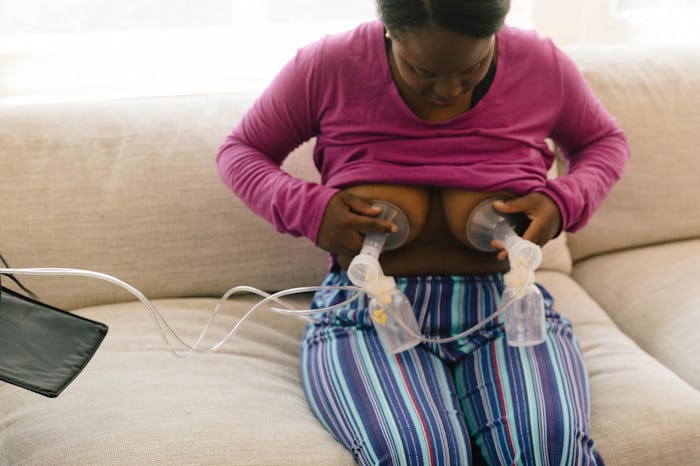As a working mom, my breast pump was my best ally in the quest to continue to work and still breastfeed my daughter. I chose an industrial grade rental pump, so when I was done pumping, I was able to return it and know it would be used by the next mom. But if you've bought your pump and are finished breastfeeding, it's time to figure out how to get rid of your breast pump. Throwing it in the trash may not be a great idea — the last thing a landfill needs is a metal breast pump that will never decompose — but it turns out there are several options.
The first thing you need to determine is whether your pump has an open or closed system. According to All About Baby's World, in an open system pump, there is no barrier between the breast milk and the tubing and motor. This can not only cause mold to grow in the tubing and motor, but can lead to air contaminants getting in there, too. In addition, if there's an infection carried in the mother's breast milk, there's a chance it could stay in the motor. It is impossible to fully sterilize an open system pump. In contrast, a closed system has a barrier and while there still can be a small risk of contamination, it's far less likely. Most personal pumps are open system pumps and only meant for one person's use. Contact your pump's manufacturer or go to their website if you aren't sure if your pump is open or closed.
The second thing to consider is if the motor is still working at full strength. Unfortunately, many pumps were not manufactured to last over multiple babies and multiple years and the motor can weaken. According to Kelly Mom, most pumps were designed to work for about a year. This becomes an issue because if the suction is not working properly, it will not extract enough milk from your breasts and your supply could be affected.
Here are some things you can consider:
Resale. Breast pumps are expensive and it's tempting to try to sell a pump and recoup some of that cost. If you have a closed system, this is a possibility. It's not recommended for an open system, but some mothers are willing to take the risks associated with the used pumps in order to save money. Sometimes, this is the only way they an afford a pump. If you are selling your pump, it's helpful to let the buyer know if it is an open system.
Donation. Several organizations will take donations to give to moms who are struggling with the cost of the pump. You could also pass the pump down to a family member or friend. As with resale, the same risks apply to an open system.
Recycling. Several manufacturers, including Medela and Hygeia, will take the used pumps and either refurbish them or give their parts to a third party for other uses. With the money they receive from the Medela Recycles program, Medela gives a donation to Ronald McDonald House to provide parents whose children are hospitalized with breast pumps. Recycling a pump keeps the pump out of the landfill, puts the parts to good use, and can help a mom in need.
As you prepare to get rid of your pump, take a look at what kind of pump it is, how long you've been using it and what you think would be the best of the three options. You also might ask the moms in your community if they have any thoughts or know of any local programs that might help you decide.
Check out Romper's new video series, Romper's Doula Diaries:
Watch full episodes of Romper's Doula Diaries on Facebook Watch.
